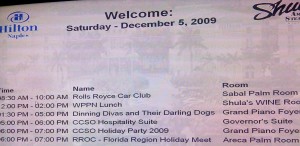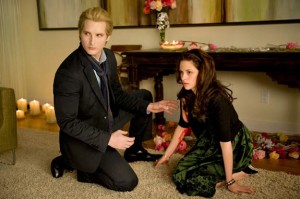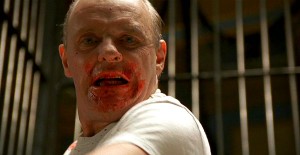At least Hester Prynne got an “A” for her adultery. I’ve searched the alphabet up and down, and I can’t find a letter to testify to my shame. Of all the sinful confessions of Think Denk, ranging from lonely Cheetos to promiscuous metaphors, this is the darkest and deepest. Here goes:
Monday night, I went to see Twilight: New Moon. For the second time.
The first time, it was a rainy afternoon. It was the second of three Beethoven Concerto performances in Naples, Florida; the beach was a dismal grey ringed by reproachful mangroves; I couldn’t bear to haunt my hotel room a moment longer, staring at the dumb mauve art. HBO was playing “The Making of Braveheart;” meanwhile, The Grand Piano Foyer, a floor below me, contained “Dinning [sic] Divas and their Darling Dogs” …

… and I had barely recovered from the Urology Specialist Holiday Party the night before. So you see, I had no choice, I had to flee the Hilton and its Grilled Chicken Caesars. A matter of life and death. A total vroom situation.
When I am driven by such desperation to The Movies, I try to selectively turn off my ears, at least the parts that feel pain when terrible music is happening. If only my new ear hair trimmer had such a function! As you can imagine, most of the music of Twilight is a spool of new age melancholy-lite with interchangeable aspartame chords and a spectacular disregard for monotony and cliché: the sort of thing you run across 12-year-old girls playing, to express themselves, on upright pianos in junior high chorus rooms after the last tater tots have been shoved down the last pimply gullet of the last smug bully before the last bus creaks out of the parking lot, sending wheezes of diesel sadness into the dusk as yet another chalky day of teaching scrawls to an end. Here’s an example:
Audio clip: Adobe Flash Player (version 9 or above) is required to play this audio clip. Download the latest version here. You also need to have JavaScript enabled in your browser.
… you get the idea. I was just settling in with my movie nachos, just getting used to this aural upholstery–anything that does not kill you, etc. etc.–when (suddenly!) a few notes reminded me that there might be a better world. Bella gets knocked against a wall, her arm’s bleeding …

… and in a flash Dr. Cullen–a vampire who has virtuously pulled back his fake hair and steeled himself to resist his blood-urge–dismisses his weaker, ravenous vampire relatives, and prepares to stitch up her gaping wound. As he stitches, we hear:
Audio clip: Adobe Flash Player (version 9 or above) is required to play this audio clip. Download the latest version here. You also need to have JavaScript enabled in your browser.
This was no nacho hallucination! There really WAS a Schubert song lurking in this teen vampire romance … and not just Joe Schubert Song, but a setting of one of the greatest Goethe poems. But why this song? And why Schubert? My mind immediately and shamelessly ran after musicological ramifications: “Schubert is sucking at the neck of the subdominant, to demonstrate vis-a-vis the fangs of his modal mixture the inadequacy of conventional polarities of dominance” … (Susan McClary, eat your heart out!) Though I dismissed the notion of a hidden musicological agenda I suddenly wondered how many vampires take refuge in the musicology faculties of our nation’s universities.
This was one of these moments where Popular Culture decides for a capricious instant that Hundreds Of Years Of The Western Canon are temporarily useful for appropriation; it does classical music a huge favor by Noticing It. Lovers of classical music are supposed to beam and pant like a petted dog, grateful for any and all attention. Wag wag, woof woof, good boy, go play in your cute tuxedo now! Classical music often serves an iconic, representative, dubiously honorable purpose in popular film, and this instance of classical quotation–besides reminding me what a steaming load of crapola I had been listening to previously–reminded me very much of the famous scene in The Silence of the Lambs, where Hannibal Lecter brutally murders and partly eats his two guards to the strains of the Goldberg Variations.

In both these scenes, classical music becomes an emblem of distance and detachment. Cullen is looking directly upon blood without giving in to his hunger; he is practicing Zen-like separation from desire. Lecter has a very different detachment, the detachment required to kill perfectly, ruthlessly, without regret or remorse; his is the detachment, the disconnect, the absence of “normal” emotion which marks sociopathy.
In both scenes, the music is ironic. It’s effective in a way that horrific or disturbing, i.e. “appropriate” music would not be. Its meaning lies in its otherness … While Lecter commits one of man’s darkest taboos (cannibalism), behind him rings the decorum and organization of Bach, with its peerless canons and schemes and rules; the Goldbergs whisper to our ears all the connotation and comfort of human Enlightenment, while the Dark Ages scream at our eyes from the screen. Cullen is stitching a raw wound; he fills a bowl full of blood … The camera lingers on both, in the way we imagine Cullen’s eyes unconsciously might; meanwhile the song proceeds in uncanny calm, a calm which feels strange against our sense of a repressed murderousness. The calm is a classical music calm, an alien calm, it evokes the price and pressure of Cullen’s self-repression. I have noticed often that the forces of Hollywood cannot use classical music to express “normal” emotions, but only extremes, only things that must be seen weirdly, in reverse.
In both scenes, blood. Both Lecter and Cullen traffic in blood, and their bloodiest scenes bleed classical music. Yes, we can say, the director is suggesting that classical music is “beauty” against which the horrors of bloodlust are seen more starkly. But if the music is supposed to be the opposite of the bloody scene, isn’t the implication somehow that the beauty of classical music is “bloodless”? Lecter is a soulless monster, and he loves Bach; Cullen is a soulless vampire, who uses Schubert to calm himself while he repairs a wound. Always soulless; always other; always anachronistic; classical music is the preference of monsters. I can see how the age of the music connects to the immortality of the vampire, I can see how the Bach connects to Lecter’s genius, but why must classical music be the language of monsters, of the fringe?
Schubert’s not distant, not alien, not detached, he’s full-blooded and alive, he’s home for me, he’s the emotional trailer park where I live, don’t you get that?, don’t you hear it’s so beautiful?, so much more intensely felt than this movie?, I wanted to scream all through the room, to the mainly 50-something women who had come alone in their Lexuses through the Florida rain to the mildewed and neglected theatre. No, no, so beautiful, I thought as Schubert’s echoes dopplered away and we returned to the morose mediocrity of the main score. I was like Bella abandoned by Edward, soundtrack bereft.
The movie proceeded like so many–a series of proppings. Yes, there’s no real plot structure but OK in the weak moments prop it up with effects. When the effects don’t work OK in the weak moments prop it up with shirtless men. The shirtless men cannot remotely act but OK in the weak moments prop it up with music, or blood. I felt a certain pity for each sadly inadequate piece of the puzzle. In fact, there could be no simpler, greater rebuke to this film than the Goethe text for the Schubert song:
Über allen Gipfeln
Ist Ruh,
In allen Wipfeln
Spürest du
Kaum einen Hauch;
Die Vögelein schweigen im Walde.
Warte nur, balde
Ruhest du auch.
[Over all the hilltops
there is rest,
In all the treetops
you hear
hardly a breath;
The birds are silent in the forest.
Only wait, soon
you too shall rest.]
A haiku house without seams, strong beyond strong. In the music of these words, there is nothing to be propped … each rhyme coolly and clearly clicks into the joints of the meaning. I’m shivering here in my kitchen just reading through it, and not just because the window’s open. You pity no word in it, no matter how humble, each simple word lives. At its foundation we find the strongest word, an untranslatable word, “Ruh,” meaning rest or calm or quiet or silence or peace. First we see “Ruh” spread over the hilltops … it’s a landscape-word. At the end “Ruh” has become a verb (“ruhest du auch”), and in this paradoxical transformation (rest acts!) the word itself becomes a poem.
A poem that appears to be painting a landscape for us turns on its heels, turns on us, and intimates our death. It does this through one other very strong word, the last word, the pillar at the other end of the arch: “auch.” How is it possible that a simple notion–you too–becomes so charged? (Don’t even get me started on how “auch” rhymes with “Hauch,” breath.) But it is, of course: all our lives we are dealing with the consequences of you too. Yes life is a story of I’m me yielding to you too, and this hint of death rings against the restfulness of the scene; the two notions are in perfect, compensatory conflict–a conflict which is from another perspective just a total, complex understanding of a single thing. Death and the peaceful landscape are hung, in suspension, against each other. The birds are in the middle of the arch, refusing to sing.
The only things in the movie that seemed as well-constructed as this poem were Taylor Lautner’s abs:

… and these elicited an appreciative “Damn!” from more than one corner of the theatre. (Schubert got no damns. Nor Goethe.) Each pair of muscles like a rhyme. The next day, after hanging up with my new personal trainer, I wondered: why are poems better than abs? Between lateral crunches, I mused: aren’t abs just poems of the stomach? But it seemed to me great poems last longer than abs. And they generally don’t require trips to the gym. As I puréed my second protein shake, it struck me, I should phone some poets, do they have phones? Did Goethe go to the gym? Maybe during his Italian Journeys? So many imponderables! But maybe there’s only one truly unanswerable question: why did I go back for a second viewing?
It was for the Schubert, I swear.



29 Comments
‘after the last tater tots have been shoved down the last pimply gullet of the last smug bully before the last bus creaks out of the parking lot, sending wheezes of diesel sadness into the dusk as yet another chalky day of teaching scrawls to an end’
Great bitterness! +1 +1 And it’s not even Friday!
The perpetual lurker speaks!
In honor of the sentence so beautifully quoted by Andy above I have decided to name my writer’s block after you, Mr. Denk. From now on, when people ask why I haven’t finished that novel, I’m going to say, “I have Jeremy.” Sadly, I’m one of the millions of uninsured so even if there were a way to medicate or inoculate, I’d be unable to partake.
Live with that!
There’s an extra level of irony in the choice of this song. If he’s a vampire, then the implicit promise of the poem is not for him. He is (I assume) undying, so no matter how long he waits, he will not be granted the rest that would free him from his unappeasable longing. Clearly this is a subtle and multi-layered film. No wonder you needed more than one viewing.
Who is singing in your Schubert clip?
Oh God. I *live* in Orlando. It’s pretty much all exactly as Jeremy has described – average age here might be a decade or two lower than in Naples, but spelling ability, musical sensibility, choice of leisure activities, movie picks and audience thereof: all too true. I think the Dinning Divas pretty much represent the acme of musical sophistication hereabouts. Easy for you to be satiric, Mr. Denk. Think of the tortured souls who find themselves actually living hereabouts. And shudder with gratitude – at least you got out.
damn! i need to see that movie! as a schubert/goethe/scarlet/denk fan only of course (and poems seen as abs)
i was in orlando a few years ago when you and joshua were performing and have kicked myself ever since over the fact that instead of seeing you i went to dine at norman van aken’s restaurant
At the AMS conference in Columbus OH in 2002, Kristi Brown presented a paper (and mutimedia performance!) titled “Perfectly Executed: Bach’s Music, Technology, and Violence in Film,” in which she discussed the subtleties of connection between certain Bach pieces (especially Golberg, especially when played by Glenn Gould) and a certain kind of cinematic homicidal maniac. You can read the abstract on the pdf here; it concludes, “Drawing on the cultural theories of Mark Seltzer […] and modern popular literature that ordains Bach as a master of structure and code, l will demonstrate how a broad network of cultural associations have particularly indexed Bach’s music for representing the ‘enlightened’ man as cold-blooded madman.”
A good time was had by all.
brillant! 😉
brilliant! 😉
NPR’s Performance Today — Pianist Jeremy Denk:
Live in Studio 4A, April 23-27, 2001
http://media.npr.org/programs/pt/images/denk.jpg (Masquerading as Bill Clinton’s long lost twin?)
Q: And your favorite movies?
A: ….3) Crimes and Misdemeanors: dubious acting but amazing plot and beautiful juxtapositions. Nice use of Schubert; 4) Tampopo: Of course there would have to be a food movie (why are musicians so obsessed with food?). Love the use of Mahler. I’m a sucker for a movie that appropriately uses a piece of classical music to illuminate a dramatic situation….
…Among the solo pieces I’ll be playing will probably be some Schubert Impromptus. Schubert is my (dare I say it?) favorite composer, and these works are late, intimate masterpieces.
Yes, right on! Michael Long makes a similar argument in his book <emBeautiful Monsters, as Phil Ford says in his review:
Death, pastness, distance, stillness, mildew: all of a piece.
See, I’m getting more and more uncomfortable with the too-quick leap to drawing conclusion about classical music (or the register of the classical) in this context. There’s a conclusion to be drawn, but it is much more specific and narrow than that.
First of all, the presence of Schubert in the background at the party MUST have something to do with the appearance of Debussy in the first Twilight movie, right? In which classical music is pretty unambiguously used by the character to prove that he’s both intellectual and sensual. And whatsherface’s recognition of the music is evidence that they have a connection both intellectually and sensually. Basically, the scene with “Claire de Lune” uses the register of the classical to signify the diametric opposite of Death, Pastness, Mildew, Unwholesome Beauty, Mad Science….
Secondly, a thought experiment: how would the party scene feel if the background music were “Heidenröslein” instead of “Wanderers Nachtlied”? Answer: different!
There’s an interesting observation to be made about the use of music in the scene, but that observation doesn’t even have something to do with Schubert in general, let alone classical music. Y’know?
I’ll be a while digesting that. I’m not normally a classical music listener – got pointed to this post by my wife – so I can’t really hear what you’re saying from the inside. But I’m fascinated.
You need to mention Alex, Clockwork Orange and Beethoven though. It’s the ground zero for whatever-it-is-you’re-trying to-say
I’ll have to agree with “Grrg”…you did make a quick leap from point A to point F; your ultimate conclusion, Classical Music = Language of Monstrosity, it’s a little extreme.
But I think you knew you were doing that, so I’ll play along.
Your earlier premise, that “classical music becomes an emblem of distance and detachment,” is something pretty stellar, applicable to far more than movie soundtracks!
I, too, am one of those stuck in a previous century. A time when a girl who could sing, play pianoforte, read, write, draw, and think, was Accomplished, not Contemptible.
Aren’t people suspicious of decorum, enlightenment, subtlety, canon? Classical music really does have to be couched in irony, or else it falls victim to reverse snobbery.
Short story: in a rural town this weekend, people were intrigued by simple pen and ink drawings. Caught unaware. The comment, over and over: “They’re so beautiful.” And the beauty was enough; it was a positive observation, not a sneer. Nice to momentarily escape to a less (popculture) educated corner of the world.
Description of Schubert’s music in movies is very US-centric, and I would recommend a viewing of trop belle pour toi for some beautiful Schubert which is part of the emotional turmoil of the main character (Gerard Depardieu, whose abs we don’t see, thankfully) but does not involve any blood. Also, we don’t see the abs of Carole Bouquet, and that’s very unfortunate.
Enough with the vampires, Jeremy, what we really want to know is if you agree with Cornel West that:
“Like Heathcliff and Catherine’s relationship in Emily Bronte’s remarkable novel Wuthering Heights or Franz Schubert’s tempestuous piano Sonata No. 21 in B flat (D.960) I will not let life or death stand in the way of this sublime and funky love that I crave!”
Who’d have thunk that Messrs Weitz, Rosenberg and Meyer would be tapping into the faux-gemütlich veneer of the Biedermeier period? Or, indeed, a good dose of post-Solomon Schubertian homoeroticism? Nice. I may go myself… but purely for the Schubert. http://entartetemusik.blogspot.com/2009/08/embittered-biedermeier.html
Is no one remembering “The Hunger”? Bowie, Sarandon and Deneuve as Schubert-E flat-Trio-playing vampires? Leading my father to rename the movie “Vampires Murder Schubert.”
How about the climactic appearance of Brahms’ Violin Concerto finale in–wait for it–“There Will Be Blood”? The music barges in immediately post bowling-pin bludgeoning and milkshake reffing. Talk about ironic distance!
hahahahhaaaaaaaaa!!!
Scott and I were just remarking how we missed you, Jeremy!
And then Randy posted your link on FB………jejejejejej!!!!!!!
I’ve noticed the trope of classical music soundtracking the violent/postviolent scene as well, and always thought that another layer of it is similar to villains in American movies often having some sort of European accent. Particularly curious when it’s British, which unlike the Russian or German accent can’t be correlated with “evil” based on recent-ish historical precedent. But it creates a sense of the other – and unfortch, to the target demographic of movies like Twilight, Schubert is most definitively *other*.
Beethoven, Op. 57, 2nd mvt.
This afternoon, I was able to be lazy: sit on the couch and watch television– to escape the actuality that I am becoming a capitalist. As I was making an effort to watch something that was mindless – yet so entertaining to me like, The Kardashians; I happened to catch Joshua Bell with Friends @ The Penthouse. (Adieu to mindless)
After Renee performed, I remembered that the pianist had a blog…and there I was surfing Think Denk . As I was cooking dinner in my “Penthouse” – a fourth floor walk-up across the Hudson River, I started to think (and question) about what JD wrote regarding films and music; and all 19 of those that commented…I guess, I get a bit excited when I hear a classical piece in a film –but, I never comment on such. Mainly, because most people do not care and I do not want to remind myself that I am a big dork. It is also for the same reason when I stop by a Starbucks and Brahms Symphony 4 is playing in the background, I simply smile as I stand in that long line waiting for a Grande Bold with room –trying NOT to hum along. Again, I would be enhancing that “dork” within and I would not want one of the Baristas to think I was an elitist on matters outside of that sacred cup of Joe.
Which brings me to my thought(s) pertaining to this post: I go to the movies to escape –the cheesier and or sappier the film the better for me. I want simple. I want average. At times, I want funny. I do not want my moment of two hours to be hijacked by the music. Movies are visual and not musical for me. I just want a simple get way.
Now, on the flip side: I hate going to the Opera because it is too visual. I just want the music. The sets and forced staging completely take away from the music. Give me Opera in a recital setting and I am there —- for the music.
And when I read a book — I do not want to hear music in the background. I want to be a hermit in stillness romancing sentences that carry a beauty I will never, ever be able to craft; but know that I am witnessing a silent symphony of words.
I like that films are not loaded with masterful works. I want music to stand alone without a visual to bend its meaning for me. I like to read without accompaniment.
This being stated, I do understand the importance of branding classical music to the masses via film and the like…and I guess it also adds to the genius of this blog.
I was reminded of this article:
http://tvtropes.org/pmwiki/pmwiki.php/Main/SoundtrackDissonance
I’m late to the party, but found your blog by way of another site. The funniest thing is, I live in Orlando, too. Weird. Anyway, I really like this post, but with one tiiiiny quibble: Lecter doesn’t eat either of the two guards. He bites Pembry’s face and eviscerates Boyle, but all of that is to aid in his escape- remember, the unrecognizable face is how he fools the rescuers into believing he’s Pembry and rushing him out of the building. Sorry to be pedantic- I wrote a couple of wicked long papers on “TSotL” back in scholl. 🙂
*school,* that is. So much for being the big know it all!
Clearly, the next time you are trapped in Naples you need rescuing. There’s this place on Ft. Myers Beach…Personally, I like it because…well…
It would have definitely distracted you from wanting a second viewing.
Caught your performance with the Phil. Masterful. But, if I’d known you were reduced to watching Twighlight, I would have been glad to help.
I’ve thought about this too…
how about the end of Sum of All Fearswhen Nessun Dorma is playing in the background whilst Clark slits the throat of that fascist? or the Spy Who Loved Me where we hear Bach’s Air on the G String while Stromberg drops his secretary into a shark tank.
Have you read Hanslick?
I’m a huge Springsteen fan but this blog puts music in a different light for me. Haven’t really thought of my music like you do Jeremy!! LOL
3 Trackbacks
[…] Schubert’s Killer Abs! Jeremy Denk is a world-famous concert pianist (who kindly gave me a lesson last October!). He also […]
[…] December 2009 at 7:46 pm · Filed under Music Interesting post by Jeremy Denk on movie monsters and classical music: Both Lecter and Cullen traffic in blood, and their bloodiest […]
[…] widely read in the online classical world (such as it is), in which he muses on topics ranging from ear hair trimmers to fending off the advances of female fans. In his music selection, Denk has cultivated a uniquely […]